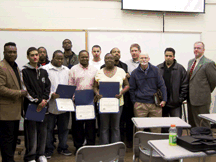 Northeast city residents, learning how to rebuild their neighborhood homes, received certificates of completion on Friday at MCC during a special ceremony.
Northeast city residents, learning how to rebuild their neighborhood homes, received certificates of completion on Friday at MCC during a special ceremony.
 LeDra Price, the only woman to complete the construction training, explains to her eight-year-old son, Xayvion, what she and other students learned during the five-week course.
LeDra Price, the only woman to complete the construction training, explains to her eight-year-old son, Xayvion, what she and other students learned during the five-week course.
A new training course at Monroe Community College that is part of a broader social movement in the city of Rochester will get more than a dozen people off the street and into high-demand construction jobs.
The pilot training course is designed to help people who are at the highest risk of unemployment or under-employment, and move them from the risk of seeking violent alternatives to attaining economic self-sufficiency. From 8 a.m. to 4 p.m. Monday to Friday, students learn introductory skills in construction so when they get on the job they have a basic knowledge of the work requirements.
The Rochester Housing Authority (RHA) and Pathways to Peace, the city of Rochester’s gang intervention program, recruited the students and will place them with local companies that serve the building and construction trades in the city of Rochester. Students are expected to work initially on abandoned houses in
the northeast area of Rochester and at the new Freedom Center, a building renovation project undertaken by North East Area Development (NEAD).
RHA, Pathways to Peace, NEAD, Community Place and the Rochester Landscape Technicians Program are among a group of community associations collaborating with MCC on Reclaiming Rochester. The brainchild of Tim Weider, instructor in sociology and human services at MCC, the collaborative focuses on positive change for the most marginalized city residents, with a result of improved quality of life throughout the city. Reclaiming Rochester currently targets Census Tract 57. The collaboration expects to expand it in the future to other neighborhoods.
“Why 40 years after the civil rights riots of 1964 are our neighborhoods worse? We have the 11th highest concentration of childhood poverty in the nation and some believe we are as racially segregated as Mississippi was in the ’60s?” questions Weider. “Beneath the stereotypes are hundreds of intelligent, talented young residents straining for opportunity to build their lives and families.”
Reclaiming Rochester comprises a grassroots effort in which people who live within the neighborhood create the positive change. For example, 20 teenagers, adults and elders from the Youth-Adult Partnership, based at Community Place, recently traveled to Boston to train in community development. And at MCC’s Damon City Campus, where nearly 1,000 students live in the city’s northeast, students in Weider’s three service-learning classes are examining research on social systems and policies that impact neighborhoods, and will provide Census Tract 57 residents with the data for them to advocate for community change.
The construction project is one visible part of the change. With tools provided by the city’s Department of Human Services and the First Baptist Church, students are learning a breadth of coursework including demonstrated understanding of worksite safety practices, proper use of hand and power tools, applied math concepts, and comprehension of basic architectural prints.
“The construction program is an excellent way of creating change within, by giving residents the necessary skills training they need to secure good paying jobs and hope for a better future,” says Anthony DiBiase, RHA executive director. Students have an opportunity to earn certification from the National Center for Construction Education and Research.
“This type of training has proven success with entry-level construction workers remaining in the field and eventually advancing in the profession,” explains Tom Fitch, program director in MCC’s Office of Workforce Development, which developed this customized training program. “The training gives these students an opportunity to secure not only a stable job with good pay, but the potential to grow and advance within the field.”
Dianne E. McConkey
Public Affairs
04/30/2007 |